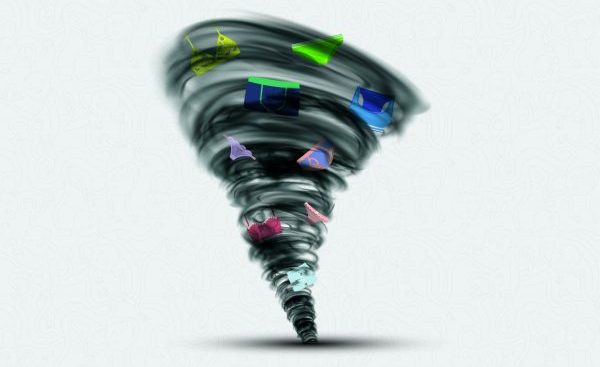Surviving the Pornado

Currently, one of the most hotly contested issues in psychology is the debate over the possible harms of excessive pornography usage. Although there are some modern twists, this isn’t a new dispute. Before Hugh Hefner was a reality star, he fought the US government repeatedly for our right to look at naked bodies. Despite the fact that his magazine, Playboy, was very popular in terms of actual usage by the populous, Nixon, in particular, did not think glossy photographs of boobs was good for the morality of the country. In 1969, Dick came up with a brilliant plan in response to the Supreme Court ruling, which said we have the right to look at whatever we wish in private, including glossy photos of boobs. What if we gather all of the best scientists, doctors, psychologists, and other professionals to study the negative effects of pornography? Then, we could rid the country of smut once and for all! As you can probably imagine, this did not work out the way he expected. The President’s Commission on Obscenity and Pornography found “no evidence that exposure to or use of explicit sexual materials plays a significant role in the causation of social or individual harms such as crime, delinquency, sexual or nonsexual deviance or severe emotional disturbances.” Furthermore, they actually found that it increased communication between partners. That was not what he was hoping for. Until the widespread use of the internet, all scientific studies came to the same basic conclusion.
Have things really changed?
Although the content remains relatively similar, the amount of pornography we have access to, is unprecedented. No other generation has seen as much sex, with as much variation, and from a significantly younger age as this one. How does this level of exposure change things? One problem is, we’ve evolved to enjoy and seek out things that are new. We get a larger burst of dopamine (a happy-inducing chemical the brain produces) when we do or see things we haven’t experienced before. Internet porn is an ocean of new sights and sounds. In seconds, we can be awash in dopamine and we didn’t even have to experience the more complicated aspect of orgasm: having to talk to another person. New studies are exploring the effects of our modern world’s new pattern of passive socializing. We no longer have to endure the agony of talking to someone and trying to have an awkward conversation with them about how we would like to explore a romantic relationship. Now we can just send a mass text of “Want to Netflix and chill?” without much risk of direct rejection. The problem is, it becomes much more rewarding to sit home alone with the unlimited action of our computer than to pursue an actual relationship. Does this mean the human race will die out because we’re too busy diddling ourselves from behind a screen? I don’t believe so. There will always be temptations that will be too much for some, whether it be chocolate, cocaine, alcohol, or pornography, anything can become addictive. We can easily get stuck in unhealthy patterns of behavior and that’s where we need to be actively helping ourselves avoid or get out of those ruts. If you find yourself preferring porn over actual interactions with other people, it may be time to take a little break. Think of pornography like dessert: If you eat it all the time and instead of meals, you probably won’t like the outcome. But in just the right amounts, it can be the perfect end to a long day.
Fawn Oates has been lecturing on topics of sexuality at the college level for 15 years. She is currently a professor at Red Rocks Community College and teaches a variety of classes including the Psychology of Gender, Human Sexuality, and the Psychology of Transgenderism.




